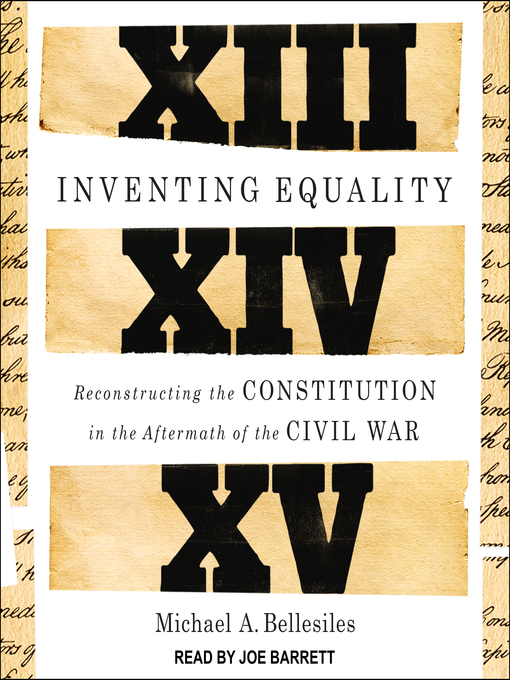Inventing Equality
Reconstructing the Constitution in the Aftermath of the Civil War
From the very beginning, American history can be seen as a battle to reconcile the large gap between America's stated ideals and the reality of its republic. Its struggle is not one of steady progress toward greater freedom and equality, but rather for every step forward there is a step taken in a different direction. In Inventing Equality, Michael Bellesiles traces the evolution of the battle for true equality—the stories of those fighting forward, to expand the working definition of what it means to be an American citizen—from the Revolution through the late nineteenth century. He identifies the systemic flaws in the Constitution, and explores through the role of the Supreme Court and three Constitutional amendments—the 13th, 14th, and 15th—the ways in which equality and inequality waxed and waned over the decades.
-
Creators
-
Publisher
-
Release date
November 24, 2020 -
Formats
-
OverDrive Listen audiobook
- ISBN: 9781705246931
- File size: 286867 KB
- Duration: 09:57:38
-
-
Languages
- English
-
Reviews
-
Publisher's Weekly
October 12, 2020
Historian Bellesiles (A People’s History of the U.S. Military) takes a stirring look at the fight to pass the 13th, 14th, and 15th amendments to the U.S. Constitution and their subsequent circumvention by Supreme Court rulings. He examines how the framers of the Constitution failed to “address the nature of citizenship” and caved to the demands of wealthy slaveholders from Georgia and South Carolina with the three-fifths compromise, and contends that the participation of Black soldiers in the Civil War contributed to the swift passage of the “equality amendments.” The phrasing of those amendments, however, excluded women, many of whom had fought to achieve equality for Black men with the understanding that they too, would be granted the same rights. Bellesiles traces Supreme Court decisions that shaped the ebb and flow of equality, including the 1857 Dred Scott ruling that led to the Civil War, and Plessy v. Ferguson in 1896, which established the deceptive principle of “separate but equal.” In the epilogue, he draws a clear line from the struggles of the late 19th and early 20th centuries to today’s battles for equality. The result is a worthy historical primer for today’s progressive activists.
-
Loading
Why is availability limited?
×Availability can change throughout the month based on the library's budget. You can still place a hold on the title, and your hold will be automatically filled as soon as the title is available again.
The Kindle Book format for this title is not supported on:
×Read-along ebook
×The OverDrive Read format of this ebook has professional narration that plays while you read in your browser. Learn more here.

